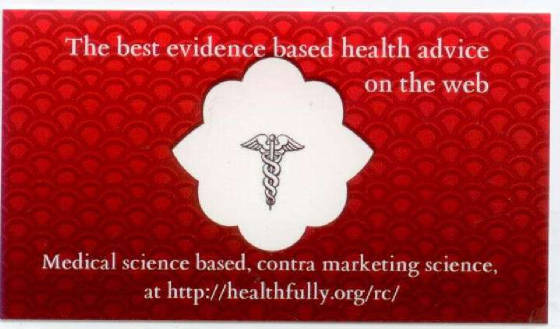 |
||
 |
||
| Home | CANCER NOTES: UNDERSTANDING CANCER--jk | CANCER: a Summary in Scientific American | CANCER NOTES: SELECTED IMPORTANT TECHNICAL TOPICS--jk | Signaling that promotes cancer metastasis | Stem cells & deadly cancers--new findings | Bacteria & Cancer--the Complex Ecology | CHEMOBRAIN: Cognifitive impairment from chemotherapy | Drug Treatment of Breast Cancer Questioned--British Study | why chemotherapy increases media survival under 6 months | TOBACCO--NUMBERS OF DEAD AND CAUSES | TOBACCO SMOKE--jk | CHEMICALS FOUND IN TOBACCO AND HEALTH CONSEQUENCES | THE CHEMICAL CAUSE OF CORONARY DISEASE IN SMOKERS | Metastasis, new prophylactic treatment | Cancer risk, standards of evaluation | T-CELL TRIUMPH--success with terminal skin cancer patients | T-cell therapy using modified bacteria | COLON CANCER, an excellent overview | Aspirin & cancer, mechanism, etc. | Coated Aspirin lowers gastric mucosal damage | TERMINAL CANCER--chemotherapy for most types makes little difference | ALTERNATE TREATMENT & INDUCED IMMUNE RESPONSE | 2002 LUNG CANCER STATS | COLON CANCER, sigmoidospy, colonoscopy, & virtual colonoscopy | Basic Facts About Breast Cancer | cancer & methylation | ||||||||||||||||
|
ON CANCER, |
||||||||||||||||
|
This is an older site, and since then I have discovered major flaws in the analysis and
treatment all of which make sense if you put the glasses on of a president of a pharmaceutical company, what I call "tobacco
ethics". At /rl is the product of 6 months of research based on Otto Warburg (https://en.wikipedia.org/wiki/Otto_Heinrich_Warburg) and the work and lectures of Prof. Thomas Seyfried. Of
special interest is a very effective treatment for
most cancers with minimal side effects, aspirin. It stimulates the body’s necrosis factor for
destruction of abnormal cells. It is well supported by dozens of journal
articles, yet it has not entered into treatment protocols—such is the power of
pharma. At the end of the article is the
section on aspirin. This article is
periodically updated at http://healthfully.org/rc/id16.html
and
a long version is at http://healthfully.org/rl/id4.html
INTERNAL SITE SEARCH ENGINE by Google
New 1/13/17 cancer
#176 RECOMMENDED CANCER, DIET, MACROPHAGE /rcdm 2/13/17 Neurodegenerative
#177 RECOMMENDED
NEURODEGENERATIVE DISEASES, KETONES /rndk
Diabetes 6/1/17
#178 RECOMMENDED DIABETES /rt2d
Wellness class
6/26/17 #177 RECOMMENDED WELLNESS CLASS /rwc
Looking
for a topic, use Google
Internal Search Engine
Google
internal search engine
ABOVE & BELOW -- please use
MEDICAL LINKS
This site is one of
3 sites maintained
by California Skeptics
All with cool art
and informative
articles 6/1/17
#31 TABLE OF
CONTENTS healthfully, over 1,200 pages downloaded per day.
#7
TABLE OF CONTENTS skeptically, over 8,000 pages
downloaded per day.
#201 TABLE OF CONTENTS CURRENT NEWS , over 900 pages downloaded per day
# 220 POD
CASTS & U-TUBE, for those who like the visual on
skeptical issues
#158 RECOMMENDED GATEWAY PAGE Gateway
to the research on pharma and health
#152 RECOMMENDATIONS--CONCISE
Bad drugs, good drugs, contra pharma
#161 RECOMMENDED HEALTHFUL Improving health including diet and nutritional
science
#157 Video documentaries, mostly YouTube Healthful
diet, bad
pharma, GMOs etc. with description
BUSINESS PROBLEMS:
#152 RECOMMENDATIONS--CONCISE
Drugs to avoid and take
#159 RECOMMENDATIONS--LONG
Topics developed
#160 RECOMMENDED EXPOSING PHARMA
Profits before people
#161
RECOMMENDED HEALTHFUL
Nutrition in depth,
diet myths, plus diets
#156 RECOMMENDATIONS NON-TECHNICAL
SUMMATIONS Simple info and advice
#157
RECOMMENDED MORE BAD PHARMA More profits before people
#166
RECOMMENDED CRITICS
Those who expose bad pharma
#167 RECOMMENDED ARTICLES ON DIET
AND FOODS
#168 RECOMMENDED ARTICLES ON
DIETARY ISSUES
#176 RECOMMENDED CANCER, DIET,
MACROPHAGE Cause and starving cancer
#175 RECOMMENDED DIETARY TOPICS BY
JK
#173 RECOMMENDED
HEART ISSUES heart
#169 RECOMMENDED
JOURNAL ARTICLES
#170 RECOMMENDED
MORE JOURNAL ARTICLES
#172 RECOMMENDED
DIET JOURNAL ARTICLES
#177
RECOMMENDED
NEURODEGENERATIVE DISEASES, KETONES
#174 RECOMMENDED DIET TESTIMONIALS
#177 RECOMMENDED WELLNESS CLASS
#17
QUACKERY (at skeptically.org)
#102 QUACK THEORIES & PRACTICES (at skeptically.org)
#136 ENVIRONMENT & HEALTH
#146 FDA
Exposing the fašade of regulation
#147 FOR THE CHILDREN
#162 CORPORATE DRUGS
#150 BLOOD THINNERS AND ACETAMINOPHEN
#152 INDIGESTION DRUGS
GENERAL
INFORMATION:
#31 INDEX
#148 FEMALE HORMONE REPLACEMENT
#171 SEX
#154 FOOD
#133
THE HEART
#144
HEART MEDICATIONS & TREATMENTS
#155 CANCER
TREATMENTS
#165. CONDITIONS
& TREATMENTS
#143 OBESITY
#163 NATURALISTIC
TREATMENTS (positive)
#153 EFFECTIVE
DRUGS
MISCELLANEOUS: #42 RHYMED POEMS SOCIAL
MESSAGE e-mail to thinker@skeptically.org There is grass root revulsion to the current corporate health industry, with pharma doing
the most harm. The best account of bad pharma is by Danish Prof. Peter Gotzsche in his 2013 book Deadly Medicine and Organised Crime: How big pharma has corrupted healthcare. Prof. Gotzsche’s book has won the British Medical Book Award given by the BMA
(British Medical Association which is comparable to our AMA). Further endorsement
comes from the Richard Smith former Editor-in-Chief of the BMJ (British Medical Journal) and Drummond Rennie, Deputy Editor
of JAMA (Journal of American Medical Association) which are 2 of the 4 leading English medical journal. The President’s Lecture on YouTube by Harvard Professor
Marcia Angell confirms Prof. Gotzsche’s book. Pharma is worse than you can imagine.
The topics of aspirin and tobacco have their own sites.
The best treatment
for a cancer is excision, or if not possible X-ray treatment. For 90% of cancers
aspirin
is the best chemotherapy. It stimulates
the body’s necrosis factor for destruction of abnormal cells. And in so
doing it very significantly lowers
the risk of undetected colonies of cancerous tissue becoming metastatic. It is
well supported by dozens of journal articles, yet it has not entered into
treatment protocols—such is the power of pharma. There are 2 articles
written by me on cancer
a shorter and a long version; they educate and explain
my thumbs 90% of chemotherapies. Aspirin also in high dose
reduces by about 50% the conversion of precancerous cells into cancer. For this
reason I have been taking one-to-two
325 mg aspirin tables since 1991.
I have taken a long-hard look how pharma runs clinical
trials and how regulatory agencies review the stage 3 clinical trials. Simply
put the trials are marketing tools,
for confirmation click on link. Reading
the material I have posted you will understand why I would not follow the
sincere recommendation of an oncologist.
After radiation or excision further treatment is not in the patient’s
interest—with a few exceptions. Oncologists
are very good at selling their product. |
||||||||||||||||
|
|
|||||||||||||||||||||||||||||||||||||||||||||||||||||||||||||||||||||||||||||||||||||||||||||||||||||||||||||||||||||||||||||||||||||||||||||||||||||||||||||||||||||
|
9.267 x 52 = 481,884 General Summary 1. Host name jerrymondo 2. Program start time 3. Time of first request 4. Time of last request 5. Time last 7 days lasts until 6. Successful server requests 1,011,280
Requests 7. Successful requests in last 7 days 9,267 Requests 8. Successful requests for pages 616,702
Requests for pages 9. Successful requests for pages in last
7 days 9,267 Requests
for pages Your site had 1213 page views yesterday and 38066 page views so far this month.
Much of the
healthfully website has been devoted to who our healthcare system scams
people. Consider your doctor a sales
person, and the literature and advice often not in your best interest. We
recommend a long hard look at the evidence in support of chemotherapy. Remember that journal articles are positive biased--average over
30%. Secondly the doctor and his
employer have a financial incentive to push chemotherapy. Third that most chemotherapy extend life only
a few weeks and do not appreciable increase survival--jk. Another British Medical Journal article estimates that only 10% of
cancer cures can be attributed to chemotherapy, and most of that is in the few
were the drug can actually destroy, rather than rest, the cancer’s growth, such
as for a few types of leukemia and
testicular cancer. Finally in the push for the drug, the positive biased
studies do not list absolute mortality only that from the treated cancer. Balanced assessments are rare. Good
sources are Worstpill.org and Wikipedia.org. If you want to make an informed decision, don’t
rely upon those who have a vested interest.
Table 24-1
Cancer Incidence and Cancer Mortality in the United States, 1993
Type
of
Cancer
New Cases per Year Deaths
per Year Total
cancers 1,170,00 528,300 Cancers
of epithelia: carcinomas 992,700 (85%) 417,175 (79%) Oral
cavity and pharynx 29,800 (3%) 7,700 (1%) Digestive
organs (total) 236,900 (20%) 120,325 (23%) Colon
and rectum 152,000 (13%) 57,000 (11%) Pancreas 27,700 (2%) 25,000 (5%) Stomach 24,000 (2%) 13,600 (3%) Liver
and biliary system 15,800 (1%) 12,600 (2%) Respiratory
system (total) 187,100 (16%) 154,200 (29%) Lung 170,000 (15%) 149,000 (28%) Breast 183,000 (16%) 46,300 (9%) Skin
(total) (>700,000)* 9,100 (2%) Malignant
melanoma 32,000 (3%) 6,800 (1%) Reproductive
tract (total) 244,400 (21%) 59,950 (11%) Prostate
gland 165,000 (14%) 35,000 (7%) Ovary 22,000 (2%) 13,300 (3%) "
Uterine cervix 13,500 (1%) 4,400 (1%) Uterus
(endornetrium) 31,000 (3%) 5,700 (1%) Urinary
organs (total) 79,500 (7%) 20,800 (4%) Bladder 52,300 (4%) 9,900 (2%) Cancers
of the hemopoietic and immune system: leukemias and lymphomas 93,000 (8%) 50,000 (9%) Cancers
of central nervous system and eye: gliomas, retinoblastoma, etc. 18,250 (2%) 12,350 (2%) Cancers
of connective tissues, muscles,
and
vasculature: sarcomas 8,000 (1%) 4,150 (1%) All
other cancers + unspecified sites 57,050 (5%) 43,425 (8%)
INTERNAL SITE SEARCH ENGINE by Google
^^^^^^^^^^^^^^^^^^^^^^^^^^^^^^^^^^^^^^^^^^^ |
||||||||||||||||||||||||||||||||||||||||||||||||||||||||||||||||||||||||||||||||||||||||||||||||||||||||||||||||||||||||||||||||||||||||||||||||||||||||||||||||||||||





